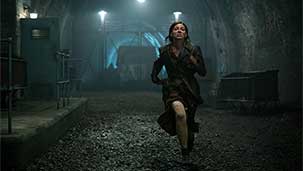Overlord announces its self-awareness in the first thirty seconds: the title card flashes onscreen over a monochromatic shot of bombers coasting across the sky, designed to mimic the aesthetic of a 1950s war film, complete with the Panavision trademark and minuscule copyright type.
This is a movie that knows it’s a movie, and such a declaration makes it clear that, for the next two hours, we’ll be living in a world that obeys the flexible physical laws of movies: bad guys have terrible aim, while good guys can take out an entire squadron with a single machine-gun burst; bad guys are deaf to gunshots and screaming in the next room, while good guys will stroll through densely populated enemy compounds without being seen. All of this happens in Overlord. It’s the story of a rag-tag team of American soldiers who must infiltrate a German base to shut down a radar tower on the eve of D-Day. It turns out, however, that much Nazi experimenting is going on within the compound, and the G.I.s find themselves dealing with more than just Wehrmacht cannon-fodder.
The specter of John Carpenter (figuratively, not literally) looms large over this flick. One of his films, in particular: the beloved 1982 sci-fi horror classic The Thing. Carpenter made his career from knowing how to navigate the narrow path between winking knowingness and verisimilitude. And that’s precisely the place Overlord wants to be. But it’s not just the tone of this film which gave me Thing-vibes—It’s the presence of the actor who you were assigned to body-double: Wyatt Russell. He’s the son of Kurt Russell, who played the gravel-voiced, shit-kicking, no-nonsense helicopter pilot tasked with stopping a malevolent alien force from taking over the world. In Overlord, the younger Russell (who bears a striking resemblance to his dad) plays a gravel-voiced, shit-kicking, no-nonsense explosives expert tasked with stopping a malevolent supernatural force from taking over the world. The movie even pays visual homage to The Thing in some of its gorier scenes, as when a character breaks his own neck and finds his head dangling upside-down behind his shoulder blades.
But there’s something missing from Overlord—some essential substance that Carpenter knew how to alchemize, that even the bloodiest low-budget/high-concept movies possess. Dreadful things happen, but I never felt dread. Threats are ever-present, but I never felt like any of the characters – let alone the free world – was in danger. Without dread, without consequences, it’s hard for a horror film (especially one that leans so heavily on its premise) to be much fun to watch.
Maybe the whole Nazi thing is played out for me. From Indiana Jones to Inglorious Basterds, World War II-era Nazis have provided ample fodder for righteous bloodshed. In the moral economics of action films, seeing a bunch of Nazis mowed down barely registers as an act of violence. They’re grist for the mill, like zombies, or the hordes of disposable CGI aliens who are always attacking superheroes. However, in the last few years, as those who have adopted the grotesque beliefs of the National Socialist movement become increasingly (and alarmingly) comfortable self-identifying as Nazis, the image of a swastika as visual shorthand for cartoonish villainy seems a bit retrograde.
And make no mistake: the Nazis in Overlord are cartoon villains. They spit on a little kid’s baseball, they laugh maniacally as they gun down defenseless villagers, they leer and pontificate about power as they threaten women with sexual assault. Which would be fine, if the film happening around them exaggerated its stakes in the same way. But there’s something too muted about Overlord. Even as the plot picks up speed, and undead Nazi super-soldiers start chasing our heroes down dark corridors, its momentum seems to die. (I’m going to blame all of this on Bokeem Woodbine, who brings so much bombast and energy to the opening sequence that he puts the rest of the cast – maybe the entire a movie – in a position it can never quite recover from).
Acting is hard. Like, physically demanding, I mean. Which is why someone like you is needed on set. You come in for the second unit shots, standing far off in the distance, or with your back to the camera, generally just filling the frame. Ultimately, Overlord feels like the body double of a much better film: it has the right shape, it’s wearing the right costume, it’s moving the right way, but once you take a closer look, you realize it’s just there to occupy the space.
Sincerely,

Jared







